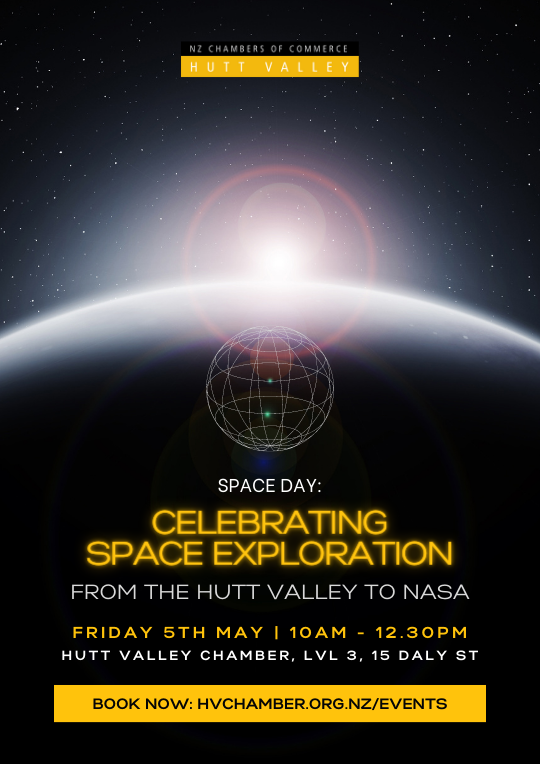Space Day: Celebrating Space Exploration - From the Hutt Valley to NASA
No events to show
Description

Are you curious about all things to do with aerospace, planets, stars and their observation and the science and technology that makes space exploration possible ?
It is International Space Day and the Hutt Valley Chamber Of Commerce are offering you the opportunity to hear from leading scientists from Robinson Research Institute and Astrobiologists from New Zealand Astrobiology Network and Researchers from Victoria University of Wellington focusing on Clusters of Galaxsies.
We encourage you to expand your knowledge and curiosity and learn more about Space and Space exploration and the incredible scientists that are carrying out world leading research and development here in the Hutt Valley.
Additional information
This event will include talks from the speakers listed below as well as interactive activities and demonstrations including Mars Rovers.
SPEAKERS
Betina Pavri, senior principal engineer, Robinson Research Institute
Betina was previously working at NASA’s Jet Propulsion Laboratory, her background is in developing instruments and operating them in space. She worked on Missions such as Dawn creating instruments that allowed scientists to answer questions about asteroids in the Vesta belt. She then worked on the Mars Curiosity Mission where she again developed science instruments to be used on it.
Randy Pollock, Chief of Space, Robinson Research Institute,
Randy was previously working at NASA’s Jet Propulsion Laboratory, Randy’s first major role was as a systems engineer working on the Atmosphere Infrared Sounder (AIRS) for JPL. He later became chief engineer on an instrument called SHERLOC (Scanning Habitable Environments with Raman & Luminescence for Organics and Chemicals).
His latest project, the Earth Surface Mineral Dust Source Investigation (EMIT) will study the minerals lifted into the atmosphere in Earth’s dusty regions.
Haritina Mogoșanu, Executive Director of the New Zealand Astrobiology Network (NZAN) and a research scientist for the Blue Marble Space Institute of Science (BMSIS).
Haritina (Hari) is a dedicated astrobiologist with a diverse background in horticultural engineering, international security, intelligence, risk analysis, and planetary protection. Boasting operational and leadership expertise, Hari has successfully organized and directed analog Mars missions, managing field scientists to ensure mission success.
Haritina's contributions to the field have extended to organizing and attending analog astronaut missions at the Mars Desert Research Station in Utah. Here, Hari has conducted research on human factors relevant to Mars exploration while incorporating extensive outreach components through programs for schools and communities.
Sam Leske, Director of the New Zealand Astrobiology Network (NZAN)
In 2019, Sam and his partner, Hari, established a stargazing business that has since become an important component of Wairarapa's tourism infrastructure. This innovative venture also focuses on providing space science education and professional learning development in schools. Sam and Hari have traveled extensively across New Zealand, visiting over 70 schools and introducing 16,000 people to the wonders of the cosmos through their portable planetarium and space science programme.
During the recent Christmas holidays, Sam and Hari established the Wairarapa Space Science Centre for 45 days, drawing in 3,300 visitors. This achievement coincided with Wairarapa's accreditation as a dark sky reserve, highlighting Sam's commitment to fostering a love for astronomy and preserving the pristine night skies for generations to come."
Yvette Perrott, Victoria University of Wellington, Lecturer & Researcher
Yvette grew up in Auckland and studied Physics, Italian and Spanish at the University of Auckland before going to Cambridge University in the UK to complete a PhD in Astrophysics. She moved back to NZ in 2019 to take up a position as a researcher and lecturer at Victoria University of Wellington. She studies the biggest things in the Universe: clusters of galaxies, and in particular the hot gas that fills them. This hot gas produces signals in the radio and X-ray wavebands, and Yvette is interested in understanding and interpreting those signals to learn about the overall physical properties and structure of galaxy clusters.
Tulasi Parashar, Victoria University of Wellingto, Lecturer & Researcher
Born in North Indian state of Punjab, Tulasi drifted long distances in India for his undergraduate and master's degrees in physics. He then moved to the United States where he got his PhD from the University of Delaware. He then worked at NASA's Jet Propulsion Laboratory and University of Delaware as a postdoc/ research scientist before coming to VUW. His research interests span a wide spectrum: from satellites in Earth orbit to interplanetary plasmas, extending to distant astrophysical systems such as clusters of galaxies. In short, if something's turbulent and/or is in a plasma state, you can get him excited to study it. You can also easily get him to talk for hours about teaching all things space.
Event Information
WHEN Friday 5th May 10am - 12.30pm
WHERE Hutt Valley Chamber Of Commerce, 15 Daly Street
COST FREE
